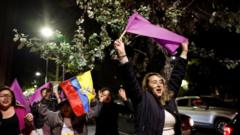Sitting centre-right President Daniel Noboa has emerged victorious in the run-off election, earning a full four-year term as Ecuador's leader. Noboa, who called his win "historic," has been in office since November 2023 following a snap election. His presidency has been marked by an intense military response to surging gang violence, which has plagued the nation and made it one of the most dangerous in the Western Hemisphere.
After the election results were announced, Noboa confidently declared, “A victory of more than ten points and over 1 million votes leaves no doubt as to who the winner is,” underscoring the significance of his win. He attributed his success to the hard work and dedication of his team. Despite an expected tight race, official data from Ecuador's national electoral council confirms his decisive lead with around 56% of the votes.
Noboa's focus during his tenure has been primarily on countering drug-related violence, which has deeply affected Ecuadorian society. Following his election, he outlined aggressive plans for a “war” against organized crime, advocating for increased military presence in urban areas and prisons, alongside the development of new maximum-security facilities. He has expressed interest in collaborating with foreign military forces from countries such as the United States, hoping to alter constitutional restrictions on foreign military bases introduced under former President Rafael Correa.
Despite a reported decrease in homicide rates, violence persists at alarming levels, and Noboa faces the challenge of demonstrating real progress in making Ecuador safer. January alone saw over 780 murders, marking it as one of the bloodiest months in recent history. Security concerns were paramount among voters, and Noboa's ability to fulfill his promises around crime reduction and economic improvement will be scrutinized moving forward.
In addition to security, Noboa has indicated ambitions to bolster renewable energy initiatives to address power outages caused by drought, which affected his popularity last year. He also aims to strengthen Ecuador's ties with the United States and has taken steps that include instituting tariffs on Mexican imports and revoking an amnesty for undocumented Venezuelan migrants.
His opponent, Luisa González, who is aligned with the highly polarizing former President Rafael Correa, has publicly rejected the election results, alleging fraud without substantiated evidence. González's calls for a recount could deepen national divisions, as many of her supporters long for the perceived prosperity during Correa’s administration.
Ecuador stands at a crossroads as Noboa navigates a politically charged environment, with the need to unify a fragmented populace while effectively combating violence and fostering economic growth.



















